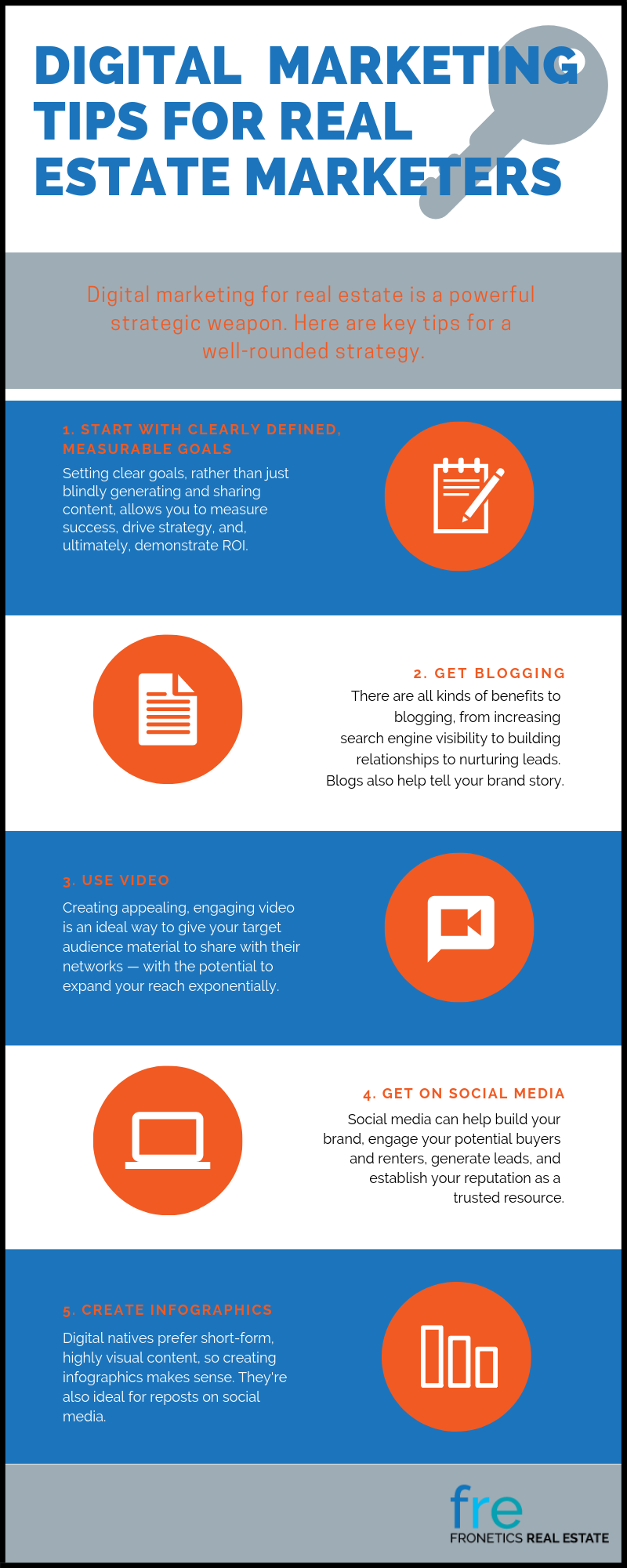Posts Tagged "Social media"

Infographic: 5 Tips to Make Digital Marketing for Real Estate Count
Digital marketing for real estate is a powerful strategic weapon. Our infographic gives you some key tips for a well-rounded strategy.
Highlights:
- 88% of all home buyers use the internet to collect information, and for 43%, an online search is their first step.
- When you kick off digital marketing for real estate, setting clear goals, rather than just blindly generating and sharing content, allows you to measure success, drive strategy, and ultimately, demonstrate ROI.
- Video is an ideal way to give your target audience material to share with their networks — with the potential to expand your reach exponentially.
As the realm of marketing has undergone a seismic shift in the past decade, digital marketing for real estate has taken off. According to the National Association of Realtors, 88% of all home buyers use the internet to collect information, and for 43%, an online search is their first step. Real estate marketers are increasingly targeting their efforts on digital media, and content marketing is one of the best ways to do this.
Our infographic below represents our favorite digital marketing tips for real estate marketers. Read on for ways you can use this powerhouse tool to market your brand and properties.
Digital marketing for real estate — 5 tips
1) Start with clearly defined, measurable goals
Effectively selling or leasing property requires a comprehensive, data-driven approach to marketing — which means starting with clearly defined, measurable goals. Are you looking to generate more leads? Raise brand awareness? Grow your social media presence? When you kick off digital marketing for real estate, setting clear goals, rather than just blindly generating and sharing content, allows you to measure success, drive strategy, and ultimately, demonstrate ROI.
2) Get blogging
Blogs help you sell real estate. Period. There are all kinds of benefits to blogging, from increasing search engine visibility to building relationships to nurturing leads. The more you publish, the higher you’ll rank with search engines. And every time you publish a blog post, you increase the chances that a user searching online for real estate will find your website.
Blogs also help tell your brand story. They help buyers imagine themselves in your space. They nurture leads and build trust among potential buyers. In a recent audit of a client’s website, we found that people who read the blog converted at an almost 30% higher rate than other web traffic. That’s significant.
3) Use video
If you’re a frequent reader of our blog, you’ll know that we’ve been writing about the astronomical rise of video in real estate marketing for a while now. We can’t stress it enough: video is here to stay, and it’s time your business starts embracing it as a highly effective content marketing tool.
Part of what makes video such an appealing form of content is its inherent shareability, which drives organic traffic. Getting your content and properties out to your base audience is one thing but empowering that audience to be your ambassadors is a huge next step. Creating appealing, engaging video is an ideal way to give your target audience material to share with their networks — with the potential to expand your reach exponentially.
4) Get on social media
Real estate is a people business. That’s why you should leverage a marketing tool that is also all about people: social media. If you have not begun developing social media strategies for your real estate business, now is the time to get started.
Consider for a minute that in 2017, 81% of Americans had at least one social media profile. And the numbers are projected to continue skyrocketing: by 2020, 200 million people just in the U.S. are estimated to be on social media. Used wisely, social media can help build your brand, engage your potential buyers and renters, generate leads, and establish your reputation as a trusted resource.
5) Create Infographics
Infographics can be one of the most effective mediums for digital marketing for real estate. We know that digital natives, who make up the majority of real estate buyers today, prefer short-form, highly visual content. So, infographics make a lot of sense when it comes to speaking their language. Infographics are also prime candidates for reposts on social media.
Since the text in infographics isn’t readable by search engines, you can make the most out of your content and bump up your SEO by including a transcript of your text with your graphic, ideally at least 350 words.
Final thoughts
Online searches have changed real estate marketing for good. In fact, the possibilities that digital marketing offers are varied, constantly evolving, and exciting. Savvy real estate marketers are using quality content to raise brand awareness, improve SEO, build relationships, and generate leads.
Related Posts:
- A Visual Guide to Social Media Posting Frequency for Real Estate
- 10 Social Media Statistics for Real Estate Marketers 2018
- 10 Quick Ways to Grow Brand Awareness
Posts Tagged "Social media"

Top 10 Real Estate Marketing Posts 2017
Here are Fronetics Real Estate’s most-viewed real estate marketing posts from the last year.
2017 was an exciting year for Fronetics Real Estate. We officially launched our brand, and website, in September. But despite our relatively recent kickoff, FRE is an entity born out of a longstanding expertise in real estate marketing. We have been working with residential and commercial real estate clients for many years under our parent brand, Fronetics.
It is that expertise that we aim to provide for the readers of the Fronetics Real Estate blog. This year, the following have been our most-viewed posts.
Top 10 real estate marketing posts
1) Using Content Marketing to Market and Sell Luxury Real Estate
In real estate sales, you want people to find your properties, like what they see, and ultimately be moved to purchase. In other words, you want to attract visitors, convert visitors to leads, and convert leads to deals. Innovative luxury real estate firms are finding ways to leverage digital tools to guide more buyers down that path to purchase. Read more
2) This Is How Often Real Estate Companies Should Post on Social Media
With social media networks changing daily, it’s hard to keep up with where to distribute content, much less how often. Countless studies have attempted to solve the social-media-frequency equation. And while audiences vary across price points and regions, best practices give us some general guidelines. Here’s our assessment of social media posting frequency. Read more
3) The Metrics You Should Be Measuring in Real Estate Marketing (Hint: Not Vanity Metrics)
Whether renting a new property or launching a social media campaign, we look for instantaneous numbers that will affirm we made the right choices. But here’s the problem: not all metrics are created equal. So-called vanity metrics are measurements that have no bearing on your bottom line but can give you an inflated sense of success. Read more
4) Learn How Content Marketing Increased Real Estate Sales by 37% in 90 Days
Consider this case study of a leading real estate marketing firm who chose to use digital and content marketing to shake up their traditional marketing approach. After just three months of beginning a digital and content marketing program, the firm recognized significant gains in web traffic, social media engagement, and brand exposure. Read more
5) This Is the First Thing You Should Do in Real Estate Marketing
Content marketing is one of the most effective ways to elevate your property’s reputation in the market, reach prospective buyers or tenants, and increase occupancy. Yet while many real estate marketers are using content marketing, not all feel their efforts are successful. Why do so many organizations feel they are failing? Simply put, they do not have a documented strategy in place. Read more
6) Real Estate Firm Grows Sales by 300% through Content Marketing
this case study about a prominent real estate marketing firm in one of the most competitive markets in the U.S. When traditional tactics weren’t bringing in the kind of business needed to sell 1,500 new-construction homes in a new planned community, the firm turned to a new content marketing program to increase web traffic and build brand awareness. Read more
7) Social Media Can Be a Strategic Weapon in Real Estate Marketing
The real estate industry is built on relationships, partnerships, cooperation, networks, and communication. Being social is a key part of forging a successful real estate marketing strategy. It’s time for the industry to embrace the tools that social media platforms offer. Read more
8) Paid Digital Advertising: A Beginner’s Guide for Real Estate Marketers
By investing in paid digital advertising, you can boost the reach of your posts, display ads, and videos. Pair quality content with a comprehensive digital advertising strategy, and you will be in a position to drive more traffic, create more brand visibility, and sell or lease more properties. Read more
9) 6 Signs It’s Time to Consider Outsourcing Your Real Estate Marketing
Real estate companies are increasingly open to outsourcing real estate management because it allows them to focus on their core competencies while improving effectiveness. So why not apply the same rationale to bolster your marketing efforts? Don’t be afraid to look outside the box for the marketing tools you need to succeed. Read more
10) 5 Tips for Building a Successful Real Estate Social Media Marketing Program
Social media is an excellent tool for real estate marketers to communicate with residents/tenants, build brand awareness, gain market intelligence, and even identify prospective tenants or buyers. Particularly if the latter is your focus, it’s easy to celebrate every follower you earn as a marketing success. But it’s important to remember that a social media follower doesn’t necessarily equal a buyer/tenant. After all, participating in social media is not only about earning a large following; it’s about building relationships with those people. Read more
Runner-up posts:
- 4 Tools for Determining the Best Time to Post on Social Media for Your Property
- Start Your Property’s Social Media Program in Six Steps
- These are the Busiest Day of the Year for Real Estate Searches
Posts Tagged "Social media"

6 Social Media Don’ts for Property Management Companies
Committing these social media don’ts when managing a property may get you in a heap of trouble.
It’s easy to get bombarded with suggestions on how to interact with your audience on social media. In fact, social media can be particularly tricky for property managers: for example, many tenants will bash your property for all the world to see for small issues or in an attempt to get a free month of rent.
But amid the endless barrage of ideas for what to do, it’s worth remembering that not all social media engagement is equal. Just as shying away from social media isn’t a good strategy, it’s also important to remember what not to do.
Let’s look at 6 specific don’ts for keeping your proverbial foot out of your business’ mouth online:
Social media don’ts for property managers
1. Don’t assume that just because you’re online, offline rules of communication and conduct don’t apply.
It may seem obvious, but it’s all-too-often forgotten. This is a good rule, and an easy metric by which to judge any content before posting: Your interactions with current and potential tenants online should measure up to professional interactions you would have in person.
2. Don’t re-post, re-tweet, re-gram, or re-share external content without a thorough check first.
Re-posting content that’s of interest to your audience is a great way to promote discussion and engagement, especially for the highly social business of real estate marketing. But don’t get sloppy. Remember that even if content didn’t start with you, if it’s posted on your property’s social media accounts, it represents your business, and can reflect on your property and professionalism. Make sure content is well-researched and from reliable sources. Want to re-post something controversial? Just be sure to include a disclaimer or explanation in your post.
3. Don’t forget that emotional intelligence is just as important for businesses as for individuals.
This one is especially key for real estate marketers, since real estate decisions are so personal. Never forget that behind every social media account is a human being. The bottom line: “Bring emotional intelligence to your social media management. Take the time to address any issues with compassion and understanding.”
4. Don’t ignore comments.
Social media is all about engagement with your audience. Yes, responding to every comment takes time and resources, but it is well worth the effort. A comment ignored sends the message that you don’t feel that your reader’s question, concern, or observation is important. Use comments as the opportunity they are to interact with your followers, and show them that you are ready and willing to address any issues they may have.
5. Don’t delete negative comments.
Another cardinal sin for real estate. Once it’s online, trust that people have seen it. Deleting a complaint will only make your business appear insensitive and evasive. Addressing negative comments demonstrates that your company is proactive about resolving issues and taking care of your tenants.
6. Don’t forget the basic principles of common sense and good judgment.
This one comes from John P. David of David PR Group. It seems like another obvious one, but people and businesses violate this principle all the time. Always have at least two pairs of eyes on everything you are going to post, and anything remotely controversial should be thoroughly vetted by as many people as necessary. When in doubt, David says, don’t post.
If your company has committed any of these social media don’ts in the past, don’t panic. These platforms offer an ideal place for renewing and tweaking your image. Invest in the creation of a good social media policy. Don’t give the enormously important task of social media management to a summer intern. And, for goodness’ sakes, remember you’re a human talking to other humans.
Related posts:
-
Social Media Can Be a Strategic Weapon in Real Estate Marketing
-
4 Tools for Determining the Best Time to Post on Social Media for Your Property
-
4 Steps to Building a Successful DIY Content Marketing Strategy for Real Estate
Posts Tagged "Social media"

These are the Busiest Day of the Year for Real Estate Searches
Real estate searches peak the weekend after Thanksgiving, December 28, January 1, and July 6, so don’t stop marketing your property during the holidays.
If you’re a marketing professional outside the retail industry, chances are you slow things down during the holidays. But before you settle in for a second helping of leftovers, consider this: according to a study by Realtor.com, December 28 is statistically one of the busiest days for real estate searches.
It makes sense: Potential buyers use their post-holiday downtime to consider real estate investment. Other days when real estate searches spike include:
- the weekend after Thanksgiving
- New Year’s Day
- July 6
It’s important for real estate marketers to be aware of these dates so that you don’t stop all your marketing activities. The good news is that real estate searches are typically lowest on actual holidays, so putting a pause on your pay-per-click advertising, for example, on those days makes sense.
I bring this up because, recently, a client asked to stop all marketing activities between mid-December and New Year’s Day due to “seasonal decline” in sales. While it’s true that December typically sees lower numbers in terms of web traffic, leads, and conversions, that doesn’t mean there is not enormous, largely untapped opportunities for this client — if we are strategic about how we spend marketing dollars over the holidays.
Leveraging the post-holiday uptick in real estate searches
While spending the holidays relaxing with family and friends is something we all deserve, keeping a few strategic marketing activities going can mean big wins for your property/properties. Here are a few things I recommend, and why.
1) Publish blog posts on a normal schedule.
Blog posts are the gifts that keep on giving, meaning the majority of traffic will visit your posts months after they’re published. In fact, 80% of our page views occur on blog posts published at least 6 months prior. It’s a great time to write about trends or happenings in the coming year in an effort to capture future searches.
Search engines value consistency in your publishing schedule, so keeping up your normal posting frequency will help your rankings. If you have the resources to post on schedule, it would benefit you to do so.
2) Be strategic about social media.
Social media management can be time-consuming, so you should dial back your posting on the days you know prospects won’t be spending much time online (e.g. December 25). That being said, you should plan to post on days when you know real estate searches peak (e.g. December 28). Chances are, many of your competitors will be shut down for the holiday, and your posts will be front and center in your prospects’ newsfeeds.
3) Be strategic about digital advertising.
The same goes for digital advertising. Knowing that post-holiday real estate searches peak on December 28, you should budget your pay-per-click and social advertising dollars to spend more on this day. Particularly focus on your Google AdWords spend because that will capture prospects using search engines to find information about potential real estate investments — as opposed to sponsored social posts, which display your ads in the newsfeed of a prospect who may or may not be ready to buy.
Related posts:





